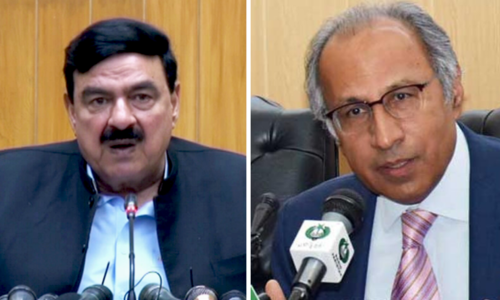IT works every time: whenever in doubt, shuffle the deck. This time around however, judges may have forced the politicians’ hands.
Sheikh Rashid has won the lottery by bagging the powerful interior ministry while jettisoning his Railways baggage. Retired brigadier Ijaz Shah finds himself in an un-envious position of being ‘demoted’ from interior to narcotics control ministry, while Azam Swati, who has braved the vicissitudes of temporary cabinet wilderness, chugs into the railway portfolio belching grand plans. But it is Hafeez Shaikh who has hit the real jackpot. From an adviser under a perceived cloud, he has been elevated to a full-fledged federal minister for finance and in all likelihood will also become a senator because as an unelected person he can only serve as a minister for six months.
So how did Sheikh and Shaikh hit the bullseye?
There were multiple reasons being whispered about the PM’s need to change his batting order.
Islamabad had been abuzz about a cabinet reshuffle for weeks. There were multiple reasons being whispered about Prime Minister Imran Khan’s need to change his batting order in the face of a mounting political run rate. The hapless information ministry had experienced the effects of a revolving door for ministers and advisers and if this were a harbinger of what portfolio mayhem was in store, many ministerial occupants, hopefuls and probables were bracing for their boss’s verdict.
There was also hushed talk that the prime minister would wait till the Senate elections to reshuffle the federal cabinet. These elections are expected to see a large number of new PTI faces becoming senators from Khyber Pakhtunkhwa and Punjab. The lobbying for the ruling party’s ticket is already under way.
The prime minister has always maintained he wants more people with expertise in the cabinet. In a meeting with columnists earlier this week, he reiterated this priority by saying that ministries like petroleum, power, IT, tourism and agriculture needed ministers who had specific knowledge of such areas. His grief was that people who won elections weren’t necessarily qualified to lead specialised ministries and therefore a talent pool of people had to be brought into the cabinet from outside the electoral reservoir.
However, the judgement of the Islamabad High Court threw a spanner in his works. It clearly stated that unelected advisers and special assistants could not run the functions of a ministry or division. The judgement explained that the elected minister was responsible for policymaking of the ministry while the federal secretary was the ministry’s principal accounting officer and exercised all executive functions. Advisers and special assistants could only advise the prime minister on the affairs of the ministry whose portfolio they were assigned.
The judgement created serious problems for the unelected ‘specialists’ who the prime minister had brought into the cabinet. Something had to give.
On Friday, it did.
Finance, interior and foreign ministries are generally perceived as the most important ones in the federal government. When PTI won the 2018 elections, all eyes were on who would bag these three ministries, plus of course the coveted posts of chief minister of Punjab and KP. It was Islamabad’s worst-kept secret that Pervaiz Khattak wanted interior, Shah Mahmood and Fawad Chaudhry wanted the CM Punjab slot and Atif Khan was the perceived choice for CM KP. In addition, Arif Alvi was almost finalised as speaker of the National Assembly and Asad Umar was a foregone conclusion as the finance minister.
In the end, Pervaiz Khattak was shunted to defence, Shah Mahmood grumbled his way into the Foreign Office, Fawad Chaudhry was parcelled off to information, Atif Khan was sacrificed to retain remote control, and Arif Alvi was laddered up into the presidency. Most of these choices have not aged well in terms of potential wasted or overestimated.
The interior ministry works very closely with the establishment for obvious reasons. It commands law enforcement and investigation agencies like Rangers, Islamabad Police, FIA and Frontier Constabulary. The interior minister has traditionally been someone who the establishment is comfortable with, and vice versa. The holders of this portfolio in previous years have included Chaudhry Shujaat Hussain, Aftab Sherpao, Rehman Malik and Chaudhry Nisar Ali Khan. It is a well-known fact that retired brigadier Ijaz Shah was recommended as interior minister in the Imran Khan cabinet by the establishment.
But then some complications crept in.
Ijaz Shah was unable to get a grip on the affairs of the ministry. Senior officials acknowledge that he was unable to develop a close relationship of trust with the prime minister even though he came recommended from very high places. When the prime minister appointed his confidant Barrister Shahzad Akbar as adviser on interior with the status of a federal minister, it was clear who would hold sway over the affairs of the ministry. With the opposition breathing down the government’s neck and threatening a long march to Islamabad, and with Shahzad Akbar hamstrung by the IHC judgement, an elected, active, trusted, and establishment-friendly interior minister was needed. Sheikh Rashid fit the bill.
Hafeez Shaikh was also an establishment-approved replacement to Asad Umar as finance minister. However, the IHC judgement had locked him out of key forums including as chair of the National Finance Commission. It was too late in the five-year term, and too deep in the IMF programme to appoint a new finance minister. Although Hafeez Shaikh was under a cloud of uncertainty, the government figured he was the best bet at this stage — when the state of the economy is almost measured in existential terms for the government — and therefore was worth saving. This saving has translated into a full federal ministership and a likely Senate seat. This means this Shaikh could outlast the government he serves.
The force of circumstances have favoured Sheikh and Shaikh. Question is: can they carry the burden of their luck?
The writer is Dawn’s resident editor in Islamabad.
Twitter:****@fahdhusain
Published in Dawn, December 12th, 2020














































